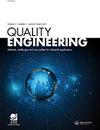具有自举改进的过程能力指数cpk的鲁棒置信区间
IF 2.2
4区 工程技术
Q4 ENGINEERING, INDUSTRIAL
引用次数: 0
摘要
【摘要】过程能力指数(process capability index, PCI),即Cpk,是目前广泛应用于评价制造过程能力的工具之一,它表示过程均值相对于工艺规范极限中点的偏差。在假设实验数据是无污染的正态分布的情况下,Cpk表现良好。在此假设下,采用样本均值和样本标准差对PCI进行估计。然而,样本均值和样本标准差对数据污染非常敏感,这将导致Cpk表现不佳。因此,在本文中,我们提出了替代传统方法的方法,即用稳健的位置和尺度估计器代替样本均值和样本标准差。我们还提出了一种构建稳健PCI Cpk置信区间的方法,该方法适合于稳健的统计假设检验。基于该置信区间的稳健假设检验方法在数据正态分布时非常有效,但在存在数据污染时也优于传统方法。关键词:自举置信区间过程能力指数鲁棒性roc致谢感谢匿名审稿人提出的有益意见和建议,特别是对结语的改进。披露声明作者未报告潜在的利益冲突。欧阳博士的工作得到了国家自然科学基金(No. 72072089)和中央高校基本科研业务费专项资金(No. NE2023004)的资助。朴教授的工作得到了韩国政府(MSIT)资助的韩国国家研究基金会(NRF)资助(no . 2022R1A2C1091319和RS-2023-00242528)。作者简介欧阳林翰,南京航空航天大学经济与管理学院副教授。他持有南昌大学工业工程学士学位,以及南京科技大学管理科学与工程博士学位。主要研究方向为过程建模与实验设计。Sanku DeySanku Dey目前是印度梅加拉亚邦西隆圣安东尼学院统计系的副教授。他于1991年在印度高哈蒂大学获得统计学硕士学位,并于1998年在同一所大学获得统计学博士学位(可靠性理论)。他在知名期刊上发表了270多篇研究论文。他是美国数学与管理科学杂志的副主编,也是几家知名期刊的编委会成员。在分布理论、连续分布离散化、可靠性理论、多分量应力-强度可靠性、生存分析、贝叶斯推理、记录统计、统计质量控制、有序统计、基于经典方法和贝叶斯方法的寿命性能指标以及不同类型的审查方案等统计学的几乎所有领域都有研究和贡献。朴chanseok Park是首尔大学机械工程系工科学生,获得了学士学位。随后,他获得了德克萨斯大学奥斯汀分校的数学硕士学位和宾夕法尼亚州立大学的统计学博士学位。他目前是釜山国立大学工业工程系教授。他还是该系应用统计实验室主任,领导应用统计小组,教授课程,并在质量和可靠性工程,竞争风险模型,稳健推理,固体力学等方面进行各种研究。在加入釜山国立大学之前,他于2001年至2015年在美国克莱姆森大学数学科学系任教。本文章由计算机程序翻译,如有差异,请以英文原文为准。
Robust confidence intervals for the process capability index C pk with bootstrap improvement
AbstractThe process capability index (PCI), Cpk, one of the widely used tools for assessing the capability of a manufacturing process, expresses the deviation of the process mean from the midpoint of the specification limits. The Cpk is known to perform well under the general assumption that the experimental data are normally distributed without contamination. Under this assumption, the sample mean and sample standard deviation are used for the estimation of the PCI. However, the sample mean and sample standard deviation are quite sensitive to data contamination and this will result in underperformance of Cpk. Therefore, in this article, we propose alternatives to the conventional method by replacing the sample mean and sample standard deviation with robust location and scale estimators. We also propose a method for constructing a robust PCI Cpk confidence interval which lends itself to robust statistical hypothesis testing. The robust hypothesis testing methods based on this confidence interval are shown to be quite efficient when the data are normally distributed yet also outperform the conventional method when data contamination exists.Keywords: bootstrapconfidence intervalprocess capability indexrobustnessROC AcknowledgmentsThe authors are grateful to the anonymous referees for their helpful comments and suggestions, particularly for enhancing the concluding remarks.Disclosure statementNo potential conflict of interest was reported by the author(s).Additional informationFundingThe work of Dr. Ouyang was supported by the National Natural Science Foundation of China (No. 72072089) and the Fundamental Research Funds for the Central Universities (Grant NE2023004). The work of Professor Park was supported by the National Research Foundation of Korea (NRF) grants funded by the Korean government (MSIT) (Nos. 2022R1A2C1091319 and RS-2023-00242528).Notes on contributorsLinhan OuyangLinhan Ouyang is an associate professor in the College of Economics and Management at Nanjing University of Aeronautics and Astronautics, China. He holds a BEng degree in industrial engineering from Nanchang University, P.R. China, and a PhD degree in management science and engineering from Nanjing University of Science and Technology, P.R. China. His research interests are process modeling and design of experiments.Sanku DeySanku Dey is currently working as an associate professor in the Department of Statistics, St. Anthony’s College, Shillong, Meghalaya, India. He did his MSc in Statistics in the year of 1991 from Gauhati University, Guwahati, India and PhD in Statistics (reliability theory) in the year 1998 from the same university. He has published more than 270 research articles in journals of repute. He is an associate editor of American Journal of Mathematical and Management Sciences and also the member of editorial board of several journals of repute. He is a researcher and has a good number of contributions in almost all fields of Statistics viz., distribution theory, discretization of continuous distribution, reliability theory, multicomponent stress-strength reliability, survival analysis, Bayesian inference, record statistics, statistical quality control, order statistics, lifetime performance index based on classical and Bayesian approach as well as different types of censoring schemes, etc.Chanseok ParkChanseok Park started college as an engineering student in the Department of Mechanical Engineering at Seoul National University and obtained a BS degree. He then received his MA in Mathematics from the University of Texas at Austin and his Doctorate in Statistics from the Pennsylvania State University. He is at present a professor of Industrial Engineering at Pusan National University. He is also a Director of Applied Statistics Laboratory in the department where he leads the applied statistics group, teaches courses, and conducts various research on quality and reliability engineering, competing risks models, robust inference, solid mechanics, etc. Before joining Pusan National University, he was a faculty member of Mathematical Sciences at Clemson University, Clemson, SC, USA from 2001 to 2015.
求助全文
通过发布文献求助,成功后即可免费获取论文全文。
去求助
来源期刊

Quality Engineering
ENGINEERING, INDUSTRIAL-STATISTICS & PROBABILITY
CiteScore
3.90
自引率
10.00%
发文量
52
审稿时长
>12 weeks
期刊介绍:
Quality Engineering aims to promote a rich exchange among the quality engineering community by publishing papers that describe new engineering methods ready for immediate industrial application or examples of techniques uniquely employed.
You are invited to submit manuscripts and application experiences that explore:
Experimental engineering design and analysis
Measurement system analysis in engineering
Engineering process modelling
Product and process optimization in engineering
Quality control and process monitoring in engineering
Engineering regression
Reliability in engineering
Response surface methodology in engineering
Robust engineering parameter design
Six Sigma method enhancement in engineering
Statistical engineering
Engineering test and evaluation techniques.
 求助内容:
求助内容: 应助结果提醒方式:
应助结果提醒方式:


